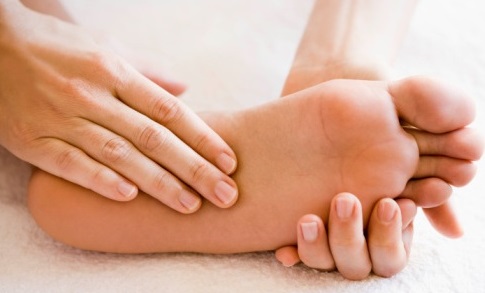Paresthesia, or "pins and needles" in layman's term, is the temporary feeling of numbness, prickling and itching on the extremities of the body. Although commonly painless and a brief sensation, it can often be chronic in nature.
Is It Temporary or Chronic?
A temporary episode of pins and needles is believed to be caused by putting a weight on a particular body part and blocking the blood supply to the nerves there. The symptoms are relieved when the weight is lifted.
Chronic pins and needles in feet can indicate of a much more severe underlying problem, such as diabetes, peripheral neuropathy and multiple sclerosis, and needs immediate medical attention.
Pins and Needles in Feet, Why?
Diabetes is a leading cause of peripheral neuropathy (making up 30% of the cases). Other 30% of the cases are idiopathic of nature whereas remaining 40% are attributed to the following conditions:

- Diabetes: About 2/3 people with diabetes suffer from some nerve damage to some extent. They may first experience tingling in both feet which radiate to legs, hands and arms.
- Nerve entrapment syndrome such as Carpel Tunnel Syndrome, Ulna, radial nerve and peroneal nerve palsies.
- Injury, often trauma-related, can also cause crushing and compression of the nerves leading to pain and pins and needles in feet.
- Vitamin deficiencies: Vitamin B12 deficiency causes pernicious anemia, a significant cause of peripheral neuropathy. Other important vitamins include niacin, vitamin E, B1 and B6. However, overabundance of B6 can also cause prickling hands and feet.
- Systemic diseases may play a part in this, such as kidneys and liver diseases, blood and connective tissue disorders, amyloidosis, hormonal imbalances like hypothyroidism, benign tumors pressuring nerves or cancers.
- Chemicals include heavy metal toxins such as lead, arsenic, mercury, thallium and other hazardous industrial and environmental chemicals. Besides, certain antibiotic, antiviral and chemotherapy medications given in lung cancer are also known causes
- Excess alcohol consumption may cause damage to the nerves, a condition called alcoholic neuropathy as well as deficiency of important vitamins such as thiamine due to bad dietary habits, which can also lead to peripheral neuropathy.
- Underlying diseases: Infectious diseases caused by herpes, HIV/AIDs, Lyme's disease, cytomegalovirus, shingles and Ebstein-Barr; Autoimmune diseases including Guillian-Barre Syndrome, Lupus and rheumatoid arthritis; and a collection of inherited diseases known as Charcot-Marie-Tooth disease.
How to Diagnose Pins and Needles in Feet
On visiting your doctor with a complaint of chronic pins and needles in feet, you will be subjected to a series of thorough laboratory tests to determine if the cause of your condition is of toxin-induced, inherited, infectious or of diabetic origin. These tests include:
- A comprehensive history about your personal and social habits, surrounding environment, occupation and family history of neurological disease will help your doctor narrow down the potential causes.
- Blood tests to check blood glucose levels for diabetes, infectious pathogens, vitamin levels and liver and kidney functions, metabolic disorders, etc.
- CSF or an examination of cerebrospinal fluid to spot antibodies indicating peripheral neuropathy
- Electromyogram and nerve conduction test to determine muscle action and proper electrical conductance of nerve impulses
- Other tests include CT and MRI scans as well as Nerve and skin biopsies to study nerve defects in more detail.
How to Treat Pins and Needles in Feet
Treatment of long lasting paresthesia depends on proper diagnosis of the underlying cause.
- Often, there's no treatment for the inherited peripheral neuropathy; however, it can be improved with proper management of the symptoms. For example, controlling blood sugar in diabetes and taking vitamin supplements can significantly impedes the advancement of the condition.
- Overall changes in lifestyle like maintaining an ideal body weight and balanced diet, specialized medically-administered exercise courses, abstaining from alcohol and preventing exposure to toxins are urged by doctors.
- Occasionally, some medicines including painkillers and those used to treat neurological conditions may be used to reduce chronic paresthesia of the limbs.
